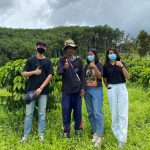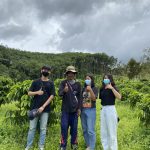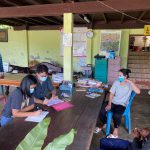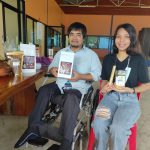Engaging the Young in the Promotion of Sustainable Coffee Farming Systems
Story: Apiradee Treerutkuarkul, Agriculture and Food Cluster
Photos: Sanpetch Kitphaibuntawee, Kodchakorn Jitsopa, Wanwisa Panit
All three students from Prince of Songkla University travelled to Ranong and Chumphon provinces to meet and learn directly from robusta coffee smallholders how to become agricultural business entrepreneurs.
Born to a farming family in the southern province of Krabi, Sanpetch Kitphaibuntawee grew up seeing his parents wake before dawn to tend to their rubber plantation. Now in their fifties, his parents also grow palm and other plants native to the tropical south. Traditional farming is very labour intensive and time consuming in comparison to the income it generates and it was these factors that made him decide to study agricultural economics at university.
Mr Sanpetch, or Oat as he is known to his family and friends, is one of the three third-year students from Prince of Songkla University participating in the internship programme offered by the Improving Smallholder Coffee Farming Systems in Southeast Asia (Coffee+) project. The three month-internship aims to give young students hands-on experience in sustainable coffee farming in Ranong and Chumphon, so they can become future farmer entrepreneurs.
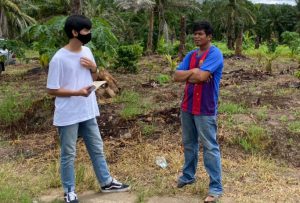
Sanpetch Kitphaibuntawee gets hands-on experience from Pichet Niampradit during a field trip to Prachuab Khiri Khan
“I have learned that coffee smallholders can transform themselves into agricultural entrepreneurs by developing farming practices that use technology and innovations to increase productivity and solve the problems of labour shortages. I can learn about the challenges and outcomes directly from coffee smallholders and adapt the Good Agricultural Practices (GAP) and the knowledge I have gained along with my studies to my parents’ plantation,” he said.
All three students travelled to Ranong and Chumphon provinces, where the project is being implemented, to meet and learn directly from robusta coffee smallholders how to become agricultural business entrepreneurs. These smallholders are participating in the Farmer Business School (FBS) introduced by the project, which helps them to implement the theory and practical knowledge they acquire in the field and the classroom.
The Farmer Business School (FBS) is one of the project’s key components and is aimed at improving the business and management skills of smallholder coffee growers. The project has been working with the Ministry of Agriculture and Cooperatives (MoAC) through the Department of Agricultural Extension (DoAE) and the Department of Agriculture (DoA) for years to enhance coffee farmers’ abilities to manage their farms as a small business. Agricultural officials also include the FBS curriculum for the training of officers so they will be able to continue passing on knowledge and skills learned from the project to support smallholders’ business capacities. This allows both the agricultural extension officers and the farmers to learn how to optimise production costs and improve their incomes.

Kodchakorn Jitsopa the coffee plantation owned by Suban Hong-ngam in Chumphon’s Pa Toh district.
A coffee drinker, Kodchakorn Jitsopa
said travelling to Kraburi district in Ranong allowed her to learn more about coffee production, from growing coffee, selecting high-quality coffee beans, and the washing and drying process of the fruit.
Unlike her classmates, Ms Kodchakorn’s family owns a restaurant in Songkhla province. The 21-year-old student intends to help her family earn more income by using the knowledge gained during the internship. “Smallholders in all sectors need to adapt to the situation especially now, with the COVID-19 outbreak,” she said, adding that her family’s business has been hit hard by the pandemic.
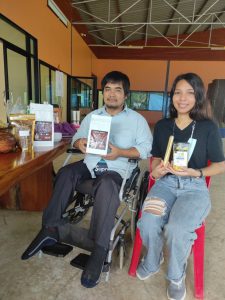
Wanwisa Panit visited coffee champion Tawatchai Khonlak, a robusta coffee smallholder in Kraburi District, Ranong province
Wanwisa Panit does not drink coffee but said the internship programme gave her an opportunity to do coffee testing, a key method in the quality control of the product apart from special blending, sizing and natural drying.
The quality of coffee mainly depends on the raw green beans and evaluating the quality of their source. She could also differentiate coffee notes – fruit, nut, caramel and chocolate, among them.
Ms Wanwisa believes coffee will still be an important cash crop in Thailand despite facing drought and declining production volume. After meeting with smallholders, Sanpetch is convinced that technology will play a vital role in all production processes from coffee cherry picking to washing, drying and roasting and manufacturing, and will be a solution for sustainable coffee farming in Thailand. This concept has also inspired him to help his family improve their plantations.
Managing land areas by doing soil analysis and conducting integrated farming also improves the livelihoods of local smallholders. Sanpetch was surprised to learn that growing betel nut, papaya and other plants together with coffee actually helps improve coffee farmers’ income. Betel nut is in high demand in neighbouring Myanmar and can be sold at a very good price. He believes agriculture will still provide a good livelihood for young farmers in local communities especially as COVID-19 continues to affect Thailand.

The three students also shared knowledge and experience learned from the project with their classmates to underline the importance of getting real experience.
Project Director Pouchamarn Wongsanga says the internship programme is beneficial to university students as it helps them develop a professional aptitude, strengthens character, and opens doors for these young people, especially those studying agriculture-related subjects. By introducing internships, the project hopes to give students the broadest spectrum of opportunity when seeking and applying for a job in the agricultural sector after completing university.
Hands-on knowledge and skill will enable the interns, especially those wishing to continue running farms with their parents, to adapt to the changing environment, the global situation on commodity prices, and reduce risks while generating more sustainable income and better livelihoods for their families and communities.
“Communities are abundant with natural resources, water, soil nutrients and more. We should provide the younger generations with technical and practical knowledge in farming management systems and business while developing innovations and technology that will help transform sustainable coffee farming while enabling young people to become farming entrepreneurs in the long run,” she said. ■

Photo Gallery
Related Resources

